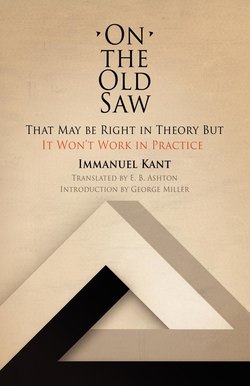On the Old Saw

Реклама. ООО «ЛитРес», ИНН: 7719571260.
Оглавление
Immanuel Kant. On the Old Saw
ON THE OLD SAW. THAT MAY BE RIGHT IN THEORY BUT IT WON’T WORK IN PRACTICE
Отрывок из книги
IMMANUEL KANT
Translated by E. B. Ashton Introduction by George Miller
.....
The first objection 14 is that Kant’s moral theory requires, as a condition for acting morally, that one renounce the desire for happiness. Since we naturally seek happiness, his theory requires one to act contrary to his nature.15 This persistent objection 16 rests on a basic misunderstanding of Kant’s theory. Kant’s theory does not require one to renounce the desire for happiness. Kant replies that one “cannot do so, nor can any other finite rational being.” 17 What is required is that we not make the desire for happiness the or a condition for acting morally. In deciding what I ought to do, it is not a relevant consideration. But this is not to say that one must renounce it.
The second objection is to Kant’s claim that I ought to do my duty simply because I recognize it as my duty. For Garve, it is “incomprehensible … how any man can be conscious of having achieved complete detachment from his desire for happiness, and thus having performed his duty quite unselfishly.” 18 If, he reasons, I cannot know that I have acted for no other reason than that I recognized it as my duty, it makes no sense to say that I ought to act in this way. Nothing, Kant replies, follows from Garve’s claim. Kant not only admits that “no man can ever be conscious with certainty of having performed his duty quite unselfishly” 19 but that it may be that no one either has or will do his duty. But, Kant observes, this does not show that I cannot do what is required of me. I may have done my duty for no other reason than that I recognized it as my duty, even though I am not certain of this. My being uncertain as to whether something was the reason for my action is consistent with the fact that it was. As long as it is not impossible for me to do what is required, I can do what I am obliged to do.
.....